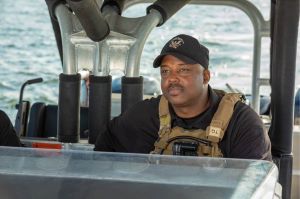Since his first ride-along with a local police department, Supervisory Marine Interdiction Agent Cleon Arrington was hooked on law enforcement. By the age of 22, he was pinning on a badge and wearing his passion for protecting his community. His love of safeguarding and serving others encouraged him to start his own security company as a side hustle, which gained the attention of U.S. Customs and Border Protection.
Arrington was originally contacted by a Border Patrol recruiter and found himself in short order at the Border Patrol Academy, where he began to hear about Air and Marine Operations (AMO). As an avid recreational boat driver who also possessed a Master Captain’s license, he was drawn to AMO’s marine operations. The incentive of combining his hobby and profession steered him toward becoming a Marine Interdiction Agent (MIA).

retirement. “I love everything about this job: the
agents, the mission, the ability to come to work and
actively pursue goals that make a difference."
“I found my age precluded becoming an MIA but held onto a hope that, similar to other CBP offices, AMO would offer waivers or change the age criteria,” recounted Arrington. When the hiring age for MIA agents was raised, Arrington left the Border Patrol and embarked on what has become his dream job.
Arrington spoke with AMO recruiters to learn more about the interview process and requirements. He relied on his boating knowledge and licensure to get through the written test and chart plotting. He pulled from his years of law enforcement experience to ace the oral interviews. Though confident in his abilities, Arrington left nothing to chance during the vessel assessment.
“I familiarized myself with the equipment, safety gear, and vessels used by marine units. My boating experience was on open water, so I actually arrived earlier than my interview, rented a boat and practiced on intercoastal waterways,” confessed Arrington. “Throughout the interview process, I felt AMO was investing in me. Interviewers were open and up front about the difficulties. Even for those who didn’t make it through the process, they were provided feedback and encouragement.”
AMO’s investment in Arrington continued throughout his training. Course instructors emphasized proficiency, not failures, and developing baseline skillsets. He left the National Marine Training Center confident in his training and expecting he would be able to dive right into the MIA job given his mariner and law enforcement experience. That notion was dashed in the wake of his first assignment.
“I lacked perspective on what was entailed and awareness of the steep learning curve awaiting me,” acknowledged Arrington. “Watching the other agents as we responded to an incident in the dead of night, I realized I was not ready to do that. Everything from navigation to maneuvers was second nature to them. AMO culture demands you be upfront about how you are feeling so I approached another crewmember afterwards. Instead of downplaying my concerns, the other MIAs worked with me until I felt ready. Thankfully, the work environment made it possible to be honest about my capabilities.”
Encouragement from leadership navigated him toward becoming a supervisor, where he realized his opportunity to give back to the next generation of agents. “AMO’s actions reflect that people really are their top priority and best asset. Bad decisions become learning opportunities, not blame games. Resources go where they are needed, providing a sense of equity. With AMO, you are not just a number but a name. I feel it and my family feels it. It is now my responsibility to not only enhance the caliber of those within our ranks but also carry on the culture.”
Arrington often finds himself providing guidance to prospective agents and recommends those interested in an MIA voyage to contact an AMO recruiter and ask to be connected with marine units. He stresses the need for proficiency in all aspects of the job, as a mariner and as an agent, to be successful. Experience has taught him that the unique skillsets required tend to weed out candidates more than any training challenges.
As for Arrington, he is in no hurry to set sail toward retirement. “I love everything about this job: the agents, the mission, the ability to come to work and actively pursue goals that make a difference. Every day I am working with a purpose. Honestly, I would do this job for free.”


